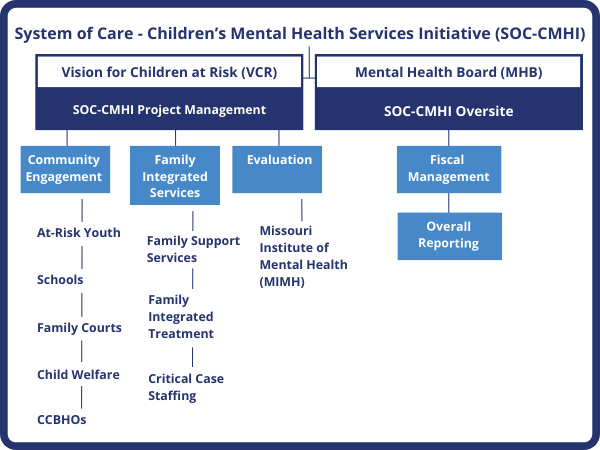Collaboration
System of Care
Overview
Goals
Connect with Services
Join Us
Partners
System of Care – Children’s Mental Health Initiative (SOC-CMHI) is supported [in part] by grant number H79SM087719 from the Substance Abuse and Mental Health Services Administration (SAMHSA). The content of this publication does not necessarily reflect the views or policies of SAMHSA or the U.S. Department of Health and Human Services (HHS).
Overview
The System of Care – Children’s Mental Health Initiative (SOC-CMHI) is a comprehensive spectrum of mental health and essential support services organized into a coordinated network to address and meet the varied needs of children, youth, and young adults at risk for or with Serious Emotional Disorders (SED)s, their families, and their caregivers.
The SOC-CMHI is a federally funded initiative working to improve mental health outcomes specifically for at risk youth and their families. The Mental Health Board received this funding through SAMHSA (Substance Abuse & Mental Health Services Administration) and is contracting with Vision for Children at Risk to provide overall project management, infrastructure services, and family support services.
The System of Care is a philosophy put into practice that builds upon the strengths of youth and their families. Care is centered around the child and driven by the family.
Mission: The mission of the System of Care St. Louis Region is to seamlessly integrate social and emotional wellness services and practices into all aspects of the care system and to ensure understanding of and access to holistic care, services, resources and support for children, youth and their families.
Vision: All children, youth and families in the St. Louis Region are served under a community-based integrated standard of care that:
- Provides resources to improve the mental health outcomes for children and youth, birth through age 21, at risk for or with serious emotional disturbances (SED), and their families.
- Supports the implementation, expansion, and integration of the System of Care approach by creating sustainable infrastructure and services that are required as part of the Comprehensive Community Mental Health Services for Children and their Families Program (also known as the Children’s Mental Health Initiative or CMHI).
- Provides mental health services to children and youth, from birth through age 21, at risk for or with serious emotional disturbance (SED) and their families.
- Prepare children and youth at risk for or with SED for successful transition to adulthood and assumption of adult roles and responsibilities.

Our Connection to the Work
VCR’s work with System of Care – Children’s Mental Health Services Initiative (SOC-CMHI) is strongly rooted in our family engagement work. In partnership with SOC collaborative agencies, we provide peer support for parents/caregivers of children or youth up to 21 years old who have a Serious Emotional Disorder (SED). We walk alongside families in a strength-based manner, keeping the family at the center of the decision-making process. Learn more about Family Support Services here.
In addition to providing direct support to families, VCR provides the project management and infrastructure services for the SOC-CMHI in partnership with the Mental Health Board. With this, we are managing and coordinating the efforts of over 45 key partners representing government agencies, institutions, organizations, and youth and family representatives.
Goals
The System of Care – Children’s Mental Health Services Initiative (SOC-CMHI) is committed to:
- Strengthening and enhancing current infrastructure to connect at risk youth and families with mental health service partners;
- Connecting at risk youth and families with Family Support Partners;
- Implementing an Integrated Family Services Model for at risk youth and families; and
- Providing peer support for parents/caregivers of children or youth up to 21 years old who have a Serious Emotional Disorder (SED).
Connect with Services
Our Family Support Partners have lived experience as a parent or family member of a child/youth with a serious emotional disorder, as well as a deep connection to the communities in the St. Louis Promise Zone. They are here to:
- Walk alongside parents/families as they navigate services;
- Connect parents/families to peer support and resources; and
- Help parents/families advocate for a stronger more effective system.
To learn more about the System of Care, contact Jawana Hammonds: jhammonds@visionforchildren.org | 314-534-6015 ext. 130.
Or call the Behavioral Health Response (BHR) Family Support Services Hotline at 314-819-8819.
Join Us
Both our organization partners and community members hold regular meetings that are open to the public. Contact us to join the System of Care Council or the Parent and Youth Advisory Councils.
Parents & Youth: Families should be at the center of decisions that impact them. Our System of Care Parent & Youth Advisory Councils are designed to put leadership and decision-making power back in your hands and to grow your impact by connecting families to a broader network of systems change makers. Learn more here or contact Jawana Hammonds at jhammonds@visionforchildren.org or 314-534-6015 ext. 130.
Partner Organizations: This work would not be possible without strong collaboration. Together, we are able to more fully serve the St. Louis region. Opportunities to partner include serving on the SOC Council, being part of our Critical Case Staffing Team, and aligning services for families. Contact Jawana Hammonds at jhammonds@visionforchildren.org to learn more.
SOC members commit to a set of actions as outlined in this Memorandum of Understanding (MOU) that produce better outcomes for youth and their families. MOU Partners are invited to participate in our Network of Practice.
Partners
SOC consists of institutions, units of government, organizations, and youth and family representatives that have all committed to advance the System of Care Philosophy. SOC is not a direct provider of services. We are a collaborative network that supports organizations and agencies that believe in a family-driven and youth-guided flexible approach to providing care.
Each child or young adult’s case is unique.
Services that the St. Louis Region System of Care partners provide include primary and behavioral healthcare, social services, education, and youth development. All of our partners are committed to helping children and youth thrive by getting the total support they need to become physically and emotionally healthy and successful at home, in school and in their communities.
- 22nd Judicial Circuit Court of Missouri – Family Court Juvenile Division
- Alive and Well Communities
- Behavioral Health Network
- Behavioral Health Response
- Bethany Christian Services; Boys Hope Girls Hope of St. Louis, Care – STL Health (formerly Myrtle Hilliard)
- Covering House; Children’s Division-City; Epworth Children & Family Services
- Foster and Adoptive Care Coalition
- Generate Health
- Homegrown STL
- Lutheran Children and Family Services of Missouri
- Missouri Department of Mental Health-Division of Behavioral Health
- Missouri Institute of Mental Health
- National Council on Alcoholism & Drug Abuse; Places for People
- Preferred Family Healthcare
- Presbyterian Children’s Homes and Services; Saint Louis MHB
- Special School District
- St. Louis County Children’s Services Fund
- St. Louis County Family Court Administration
- St. Louis County Human Services
- St. Louis Integrated Health Network
- St. Louis Regional Health Commission
- St. Vincent Home for Children
- United Way of Greater St. Louis
- University of Missouri St. Louis-Children’s Advocacy Center
- University of Missouri St. Louis-Center for Behavioral Health
- Washington University-Institute for Public Health, Center for Community Health, Partnerships, & Research
System of Care St. Louis Region is supported by Vision for Children at Risk and St. Louis Mental Health Board, with funding from SAMHSA.
DISCLOSURE: Youth who are not their own legal guardian should consult with their parent or guardian before using resources provided by the System of Care.

View Other Focus Areas
- Learn More
- Learn More
- Learn More
Upcoming Events

Children's Mental Health Celebration
A family-fun event on Saturday afternoon. Food, resources, fun!

Project LAUNCH Parent Café
Connect with other parents and caregivers to strengthen your family.

Project LAUNCH
Vitality Café
Parents charting their own paths, together, toward holistic wellness.
Children’s Data
A Data Book for the Community
Vision for Children at Risk informs the community with data and information on child well-being in the St. Louis area, builds and drives collaboration and strategic action for children, and advocates for policies and investment in children that support child well-being.


















